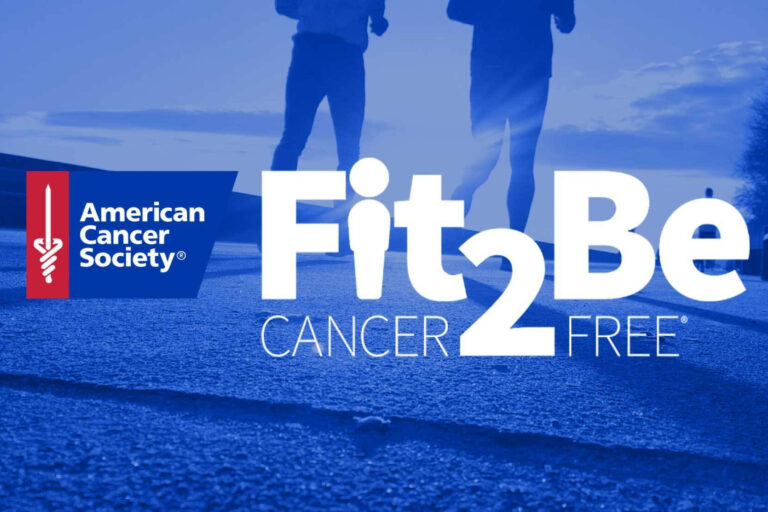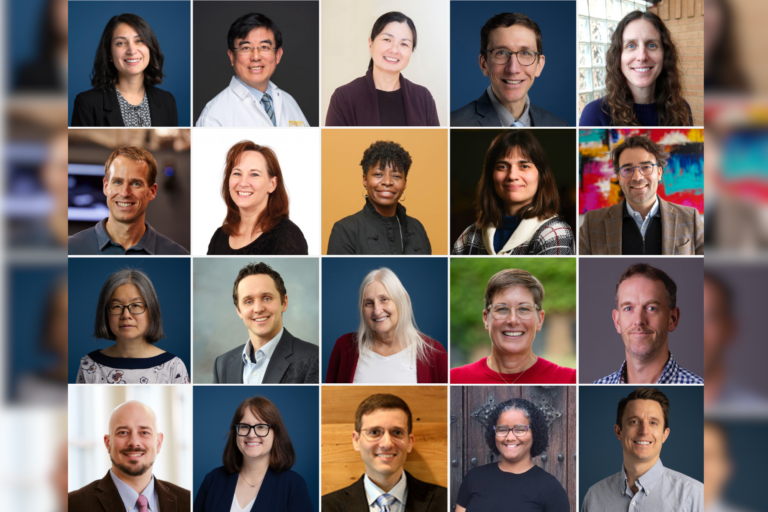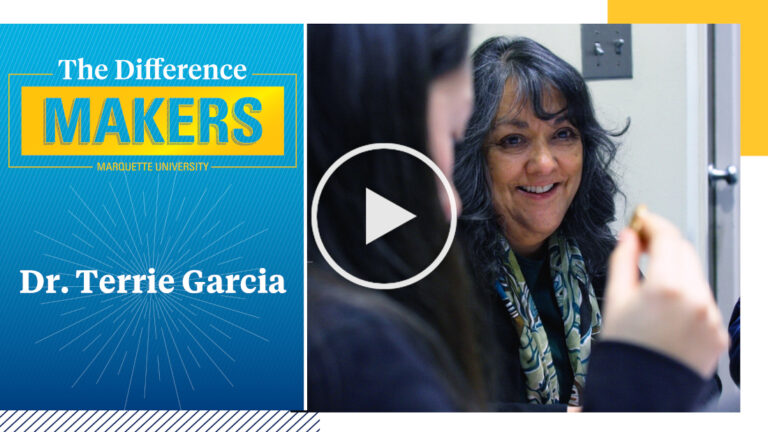Each year, the Medical College of Wisconsin (MCW) hosts “Professionalism Week,” a week filled with virtual professional development and educational presentations, workshops and networking opportunities. This year’s offerings can be found below.
The theme for the week this year is “Adapt and Evolve: Reimagining our work Together,” with topics focusing on leadership, resilience, inclusion, and much more.
Learn more about the various virtual events and register below. All events are free to attend.
As Marquette and MCW’s values are closely aligned, both institutions seek to identify more opportunities to collaborate and share ideas in the future.
With questions, contact Gary Meyer, senior vice provost for faculty affairs.
__________________________________________________________________________
MCW PROFESSIONALISM WEEK EVENTS
Monday, Oct. 18
Kickoff for Professionalism Week 2021 and Leadership Panel About Continuing to Adapt Strategies Across Industries During the COVID-19 Pandemic (noon to 1 p.m.)
- Kareeda Chones-Aguam, vice president of partner strategy and management, Milwaukee Bucks
- Jennifer Dirks, president and CEO, TEMPO
- Joseph E. Kerschner, MD, the Julia A. Uihlein, MA, Dean of the School of Medicine, provost and executive vice president
- Penelope Smiley, director of brand strategy, Kohl’s
- Kathy Thornton-Bias, president and CEO, Boys & Girls Clubs of Milwaukee
Join a panel of Milwaukee-area business leaders and TEMPO members as they provide their stories about the past year reimagining their work and adapting to the new challenges from the COVID-19 pandemic. TEMPO is a Milwaukee-based group of nearly 800 executive and emerging women leaders who have spoken up, risen above and defied conventions to succeed.
Register online.
Hindsight is 2020: The Impact of Mental Health and Resilience During the COVID-19 Pandemic (1 p.m. to 2:30 p.m.)
- Meena Bedi, MD, Sharon K. Wadina Professor in Sarcoma Research, associate professor of radiation oncology
- Jennifer Apps, PhD, assistant dean for faculty affairs, associate professor of psychiatry and behavioral medicine and pediatric neuropsychologist
- Cassie Ferguson, MD, associate professor of pediatrics (emergency medicine), director of the Student Pillar of the Robert D. and Patricia E. Kern Institute for the Transformation of Medical Education and director of the Quality Improvement and Patient Safety Scholarly Pathway
- Alicia Pilarski, DO, associate professor of emergency medicine and co-director, Graduate Medical Education Pillar of the Robert D. and Patricia E. Kern Institute for the Transformation of Medical Education
Register online.
Cultural Complications (4 p.m. to 5:00 p.m.)
- Christina Georgeades, MD, surgical resident
- Andrew Kastenmeier, MD, associate professor of surgery
- Tracy Wang, MD, MPH, professor of surgery, chief of endocrine surgery and vice-chair of strategic and professional development
Every day, patients, physicians and staff contend with implicit and explicit bias in the hospital environment and workplace. We are increasingly recognizing the negative effects of this exposure on individuals and on the culture of entire organizations. Recognizing instances of bias and developing mechanisms to combat bias are challenging but necessary in creating a diverse and equitable workplace. In the department of surgery, we have implemented the Cultural Complications Curriculum to foster discussions surrounding the complex issues of bias in the hospital environment. Designed to be presented during standard departmental Morbidity and Mortality conferences, the scenarios cover themes related to diversity, equity and inclusion. This presentation details how the curriculum was implemented in our department, and also provides examples of the themes and associated case scenarios.
Register online.
Tuesday, Oct. 19
Recognizing and Celebrating Inclusive Excellence in Action (10:30 a.m. to noon)
We will celebrate the 2021 President’s Diversity and Inclusion Award winners and give special recognition to the departments and individuals who continue to model inclusive excellence through diversity, equity and inclusion (DEI).
2021 President’s Diversity and Inclusion Award Winners:
- Staff Awardees: Charlie Ann Rykwalder, MBA, associate department administrator, business operations, department of pediatrics; Toni Gray, ODI community inclusion and outreach program manager, NCBI campus director, co-chair, Community Citizenship Mission Engagement Group, Office of Diversity and Inclusion; and Alverno Devine, DDiv, talent planning and development consultant, HR website coordinator.
- Student Awardees: British Fields, MLS (ASCP), doctor of medicine candidate, Class of 2023; and Bill Wong, doctor of medicine candidate, Class of 2022.
Register online.
At the Heart of the Matter: Practical Wisdom and Professionalism (noon to 1 p.m.)
- Clara Bosco, MD candidate, Class of 2022
- Fabrice Jotterand, PhD, MA, professor of bioethics and medical humanities, director of the Graduate Program in Bioethics, and director of Philosophies of Medical Education Transformation
De Tocqueville coined the term “habits of the heart” in Democracy in America (1835) to describe the values, motives and goals of citizens in a democracy. But these habits go beyond our minds and include moral intuitions, meaning and purpose and how we relate to others. Building on the work of De Tocqueville on the essential habits of the heart (aka virtues) of citizens, in this presentation we examine what habits of the heart are vital to become a productive citizen in the professional setting. We argue that the cultivation of the virtues with a particular focus on practical wisdom, in medical education and professional ethics, provide a deeper understanding of moral agency essential for the development of a professional identity in medicine.
Objectives:
- Examine what habits of the heart are vital to become a productive citizen in the professional setting
- Learn how to cultivate virtues with a particular focus on practical wisdom, in medical education and professional ethics
- Gain a deeper understanding of moral agency, essential for the development of a professional identity in medicine
Bioethics and Medical Humanities Grand Rounds sponsored by the Institute for Health & Equity
Register online.
Transforming blood collections during a pandemic to meet the needs of hospital blood banks (2 p.m. to 3 p.m.)
- Nichole Miller, MSTM, SBB, chief of staff, director of specialized production at Versiti Inc.
- Angela Treml, MD, associate professor of pathology and medical director of transfusion medicine at Versiti Inc.
Register online.
Wednesday, Oct. 20
Developing Grit – Strategies for Success in Work and Life (9:30 a.m. to 10:30 a.m.)
- Marci Walton, MA, MS, training consultant for ComPsych
Grit is mental toughness. Grit is the ability to persevere to achieve difficult long-term goals. Grit is strongly associated with success in personal and professional life. Grit involves several elements: passion and purpose, development of habits and coping with unpleasant emotions such as fear, discouragement or embarrassment.
This course will examine the nature of grit and identify specific methods for developing it.
Register online.
Value-Added Medical Education: Reimagining Learner Roles (noon to 1 p.m.)
- Erica Chou, MD, assistant professor of pediatrics
- Christopher Davis, MD, MPH, assistant professor of surgery (trauma and acute care surgery)
- Catherine Ferguson MD, associate professor of pediatrics and director of the Student Pillar, Robert D. and Patricia E. Kern Institute for the Transformation of Medical Education
- John Hayes, DO, assistant professor of family and community medicine
- Mark Lodes, MD, vice president and chief medical officer, Froedtert and the Medical College of Wisconsin
- Lana Minshew, PhD, assistant professor of clinical sciences, MCW School of Pharmacy
- Marty Muntz, MD, professor of medicine (general internal medicine), associate dean for curriculum and director of the Clinical Learning Environment Pillar, Robert D. and Patricia E. Kern Institute for the Transformation of Medical Education
While traditional clinical teaching activities such as taking a history, performing a physical exam, writing notes, and giving oral case presentations are clearly effective educational tools, they often lead to inefficiency and duplication of work. Meanwhile, gaps persist between current state and optimal state for patient care and learning outcomes. This session will include a panel discussion of opportunities to creatively reimagine student roles on patient care teams and participant reflection on how key concepts might be implemented in their sphere of influence.
Learning objectives:
- Discuss opportunities and barriers to implement value-added medical education activities alongside traditional teaching activities.
- Consider outcomes and metrics to measure the impact of these potential changes.
- Describe one value-added medical education activity that could be implemented in your sphere of influence to enhance care for individual patients/community, add value to the
- healthcare team, and improve learning outcomes.
Robert D. and Patricia E. Kern Institute for the Transformation of Medical Education Grand Rounds
Register online.
Informal Leaders: Who They Are and Why They Matter (noon to 1 p.m.)
- Wesley Hoffmann, business operations coordinator for the Neuroscience Research Center
Register online.
Gender Identity Allyship – From Understanding to Action (4 p.m. to 5 p.m.)
- Talia Frolkis, graduate student
- Katie Kassulke, administrative director of faculty relations/Title IX
- Charlie Ann Rykwalder, MBA, associate department administrator of pediatrics
Interactive exploration of gender and gendered language and how to respectfully communicate with trans and gender non-conforming colleagues and patients.
Register online.
Student Mistreatment: Identifying When Mistreatment Occurs (5 p.m. to 6 p.m.)
- Arthur Derse, MD, JD, Julia and David Uihlein Chair in Medical Humanities, professor of bioethics and emergency medicine, director of the Center for Bioethics and Medical Humanities
- Jose Franco, MD, interim senior associate dean for academic affairs and professor of medicine (gastroenterology and hepatology)
- Megan Glait, fourth-year medical student
- Daniel Stein, MD, associate professor of medicine (gastroenterology and hepatology)
- Benjamin Wrucke, third-year medical student
Student mistreatment is an issue receiving attention from the Association of American Medical Colleges and medical schools around the country. Research has found that identification of mistreatment varies amongst clinical disciplines, indicating a need for education and training. This session will consist of reviewing videos of potential mistreatment scenarios under the guidance of a panel of MCW experts. Participants will actively participate in the video review process and engage in discussion with the panel regarding how to identify when mistreatment occurs.
Register online.
Thursday, Oct. 21
Navigating Pandexit: Rebounding from Individual and Collective Challenges (9 a.m. to 10 a.m.)
- Kate Dielentheis, MD, assistant professor of obstetrics and gynecology
- Kristy Graettinger, MD, associate professor of obstetrics and gynecology
- Abbey Kruper, PsyD, associate professor of obstetrics and gynecology, psychiatry and behavioral medicine
Obstetrics and Gynecology Grand Rounds
Register online.
Effective Apologies: Taking Responsibility and Moving Forward (9 a.m. to 10 a.m.)
- Nate Filzen, talent planning and development senior consultant
We’ve all heard apologies that don’t really seem like apologies or end up just blaming someone else for whatever happened. Unfortunately, many of us have also probably delivered an apology like this as well. This session will provide tools for ensuring that every apology you need to make is sincere, has you taking responsibility, and best of all, moving forward.
Register online.
Which Way to Thriving? A Guided Reflection on Caring, Character and Flourishing (10 a.m. to 11 a.m.)
- Kimara Ellefson, national director for partnerships, Kern National Network for Caring and Character in Medicine
- Andrea N. Leep Hunderfund, MD, MHPE, associate professor of neurology, Mayo Clinic
What would it look like if clinical learning environments and practice settings supported well- being and purpose along with competence and continuous improvement? How might that improve quality of life for healthcare learners, professionals and staff—and, by extension, patients and society? Discover an integrated framework for advancing caring and character in medicine to promote human flourishing and explore how those core concepts work together in your own life. Through reflection and discussion, consider your experiences with flourishing and ways to promote or sustain it.
Register online.
Mindfulness and Professionalism (12:30 p.m. to 1 p.m.)
- Daniela Rodrigues de Oliveira, PhD, postdoctoral fellow
- Raul Urrutia, MD, Warren P. Knowles Endowed Chair of Genomics and Precision Medicine, professor of surgery and biochemistry, and director of the Genomic Sciences and Precision Medicine Center
This session will focus on how mindfulness gives us tools and methods to reduce stress, enhance our sense of well-being appreciation and increase satisfaction in the workplace.
Register online.
How to Become a More Inclusive Leader (1 p.m. to 2 p.m.)
- Alverno Devine, talent planning and development consultant
Why is inclusive leadership important?
We live in a diverse business world. There’s not just variability in our workforce, there also is diversity among the students we want to attract, in the patients we serve, in the messages we share or consume via various platforms and the markets we want to expand to. Inclusive leadership helps balance all these elements – inclusive leaders adapt quickly to diverse scenarios and alternate perspectives with an open, non-judgmental mind to bring on the best results possible. And research shows that, when done right, there are many benefits; teams perform better and more collaboratively and make better overall decisions. Learn realistic, best practices on your journey to becoming an inclusive leader.
Register online.
Stress: A Way of Life or a Fact of Life (4 p.m. to 5 p.m.)
- Marci Walton, MA, MS, training consultant for ComPsych
All aspects of work and life require stress—everyone experiences it. Experiencing stress is not all bad, but how we perceive stress is what’s important. Stress is our body’s normal response to any extra physical, mental or emotional demand we place on it.
This workshop will help you to understand more about stress, identify your stressors and learn ways to cope with and manage high stress levels.
Register online.
Friday, Oct. 22
Helping students become influencers: Promoting intentional involvement and building on strengths (9 a.m. to 10 a.m.)
- Matthew Anderson, MD, PhD, assistant professor of pathology, vice president and medical director of diagnostic laboratories for Versiti, Inc.
- Kelli Cole, student, MCW Medical Scientist Training Program
- British Fields, student, MCW-Milwaukee Class of 2023
- Jeff Fritz, associate professor, MCW-Central Wisconsin
- Scott Lamm, student, MCW-Milwaukee Class of 2022
- Margaret (Meg) Lieb, MS, student, MCW-Central Wisconsin Class of 2022
- Teresa Patitucci, PhD, assistant professor of cell biology, neurobiology and anatomy
- Gopika SenthilKumar, student, MCW Medical Scientist Training Program
- James Wu, MD, internal medicine resident, MCW Affiliated Hospitals
- Emelyn Zaworski, student, MCW-Central Wisconsin Class of 2023
In a Q&A Zoom discussion, we hope to draw from student and faculty panelists’ experiences to reflect on what worked well or didn’t work well for them as they pursued their passions in medicine. Topics will include: finding opportunities to work towards goals and passions in medicine; overcoming hurdles and barriers; figuring out a general direction for your career/goals; how the journey informed their professional/personal development; and, helping students be more intentional about their involvements and start thinking like influencers. We hope this discussion empowers you to reflect on your passions and achieve your unique goals.
Register online.
The Strong Black Woman Mantra: Its History. Its Myth. Its Impact (10 a.m. to 11 a.m.)
- Camille B. Garrison, MD, associate professor of family and community medicine
- Dionna L. Gavin, MA, director of diversity and inclusion for Froedtert Health
- Toni Gray, DEI program manager
- Lia A. Knox, PhD, LPC, behavioral health consultant and professional counselor
- Toni Polk, AAMS, CRPC, financial advisor
- Dominique Pritchett, PsyD, LCSW, CEO of Beloved Wellness Center
- Jennifer Ward, program coordinator, Institute for Health and Equity division of biostatistics
- Laquetta Washington, ITIL, CSM, CSP, associate vice president, program manager, NFP
The session’s objectives include:
- Bring awareness to the history of the Strong Black Woman narrative.
- Bring awareness to the negative implication of this narrative in corporate America, and mental and healthcare spaces.
- Bring awareness to the negative biases we may carry toward black women and how to effectively combat them.
Register online.


